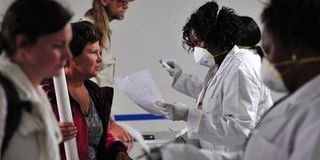The Ministry of Health had no business treating Ebola outbreak so casually

Kenyan health officials help passengers to fill out medical forms before screening them as they arrive at Jomo Kenyatta International Airport in Nairobi on August 14, 2014. A US school teacher has quit her job after being forced to take a “precautionary leave” after fears that she may have contracted the deadly Ebola during a trip to Kenya. AFP PHOTO | SIMON MAINA
What you need to know:
- In the villages of West Africa, people are still eating bats and chimpanzees, from which the virus is suspected to have come.
- We have cultural practices, especially funeral rites and the treatment of patients, which create a fertile ground for its transmission.
- There must be teams of doctors, nurses and security to subject passengers from West Africa to a proper medical examination before they are allowed on planes.
Sometimes Kenyans behave like a bunch of halfwits. There are things that are so important, one should attack them with resoluteness and unrelenting effort.
A good example is Ebola. This disease is easy to control and manage if you are well informed and rational. The most frightening thing about what we are seeing in West Africa is that people are ill-informed and irrational.
Take the example of Mr Sawyer, who took the deadliest disease known to man to Africa’s most populous nation. He knew he would infect others.
When he arrived at the airport he was so sick he could barely stand. As a result, he has put in danger the lives of 150 million Nigerians.
In the villages of West Africa, people are still eating bats and chimpanzees, from which the virus is suspected to have come. And they won’t stop because it is the food of their forefathers, they say.
RUTHLESS ACTION
They also don’t understand where the disease is coming from, so sometimes they blame health workers.
And they are scared, not knowing that your best chance of survival is not to hide but to get to a hospital as soon as possible.
There are three key reasons why Ebola, and diseases like it, deserve swift and ruthless action. First, they are a threat to our survival. Our society is disorderly, our health care and other systems weak.
We have cultural practices, especially funeral rites and the treatment of patients, that create a fertile ground for its transmission. It can wipe out huge parts of our population.
ECONOMIC DEVASTATION
Secondly, Ebola and diseases like it can spell economic devastation in communities that are already stressed. It costs money to deal with it.
Already, the Ministry of Health is going to spend half a billion shillings and the disease is not even here yet. So the nation’s resources are likely to be diverted to fight it. The labour and bread-winners could be killed. And of course, once you have it in your country, the rest of the world quarantines you for their own protection. That destroys your economy.
There is an ever-present danger of a breakdown of social order. Panic is never far from the surface when people’s lives are threatened. Society is usually held together by a fairly thin thread.
Mass hysteria and panic have the capacity to tear the fabric of society, as we have seen in those Hollywood disaster movies. So Ebola is a health, social, economic and national security priority.
BEST DEFENCE
Kenya, touch wood, has not reported a single case of Ebola. The best defence is to keep it that way. But it takes concerted, disciplined and carefully planned action to lock out the virus.
Which is why I couldn’t understand why the Ministry of Health initially took such a casual approach to vetting people entering the country. I bet there is no organised vetting at land border crossings.
I’d say let’s stop being stupid and for once think ahead. In the news business, I am required to be able to respond to a disaster every day. So I am a great believer in templating situations.
If there is a bomb attack, what do the 100-odd people on the team do? What specifically does each person go and find out? Similarly, the government should have a watertight contagious-disease response template bringing together health workers and the armed services.
PLANNED FOLLOW-UP ROUTINE
For a start, I think flying into the Ebola hot zone in West Africa — Monrovia, Conakry and Freetown — is reckless.
Secondly, there must be teams of doctors, nurses and security to subject passengers from West Africa to a proper medical examination before they are allowed on planes.
Thirdly, at the point of entry, there must be a thorough medical examination and a planned follow-up routine for all from the affected areas.
Isolation facilities must be built at the airport. That nonsense about saying you will transport Ebola patients to Kenyatta National Hospital is like saying you will go to Majengo for a weekend of sex without a condom. How do you prevent contamination in transit?
Finally, it’s all about public information: to teach people what to do and what not to do, when to panic and when not to panic.
Now, I edit the biggest newspaper in East and Central Africa. No one has called to say they need help informing my readers how to stay safe.
Please, is it possible to get organised? Even when our lives could be at risk?





